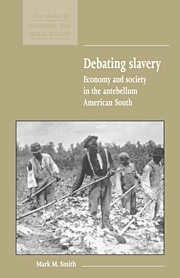Book contents
- Frontmatter
- Contents
- List of figures
- List of tables
- Preface
- 1 The contours of a debate
- 2 Slaveholders and plantations
- 3 Yeomen and non-slaveowners
- 4 Slaves
- 5 The profitability of slavery as a business
- 6 The Profitability of slavery as a system
- 7 New directions, toward consensus
- Bibliography
- Index
- Economic History Society
- New Studies in Economic and Social History
- Studies in Economic and Social History
3 - Yeomen and non-slaveowners
Published online by Cambridge University Press: 05 June 2012
- Frontmatter
- Contents
- List of figures
- List of tables
- Preface
- 1 The contours of a debate
- 2 Slaveholders and plantations
- 3 Yeomen and non-slaveowners
- 4 Slaves
- 5 The profitability of slavery as a business
- 6 The Profitability of slavery as a system
- 7 New directions, toward consensus
- Bibliography
- Index
- Economic History Society
- New Studies in Economic and Social History
- Studies in Economic and Social History
Summary
The majority of the South's white population were non-slaveowners and yeomen and, as such, their role in southern society has generated sometimes heated debate among scholars. Were southern yeomen and non-slaveholders a poor, dependent, peripheral social class, as some early twentieth-century historians have argued? Or were they in fact an independent social class, central to the Old South's society, polity, and economy? (Campbell, 1987). Moreover, who were the yeomen? How may we best define them? Historians have yet to agree on any of these issues, not least because they have rightly recognized the need “to show that the plain folk were more varied, more complex, than the popular usage suggests” (Boles, 1997, p. x). This chapter considers the southern yeomen and non-slaveowners, explores the debate concerning their relationship to the South's planter class, examines the precommercial and market-oriented characteristics of these classes, and ends by considering why the yeomen fought for a slaveholding society during the Civil War.
A good deal of talent and energy has been expended on trying to ascertain the nature of the relationship between planters and yeomen. The most salient questions posed concern the extent to which yeomen were independent of the South's planter elite. Yeomen of the South's plantation belt, argue some historians, yielded much more easily to planter political leadership than did their upcountry brethren. But even upcountry yeomen, other evidence suggests, were tied economically and politically to the planters.
- Type
- Chapter
- Information
- Debating SlaveryEconomy and Society in the Antebellum American South, pp. 31 - 41Publisher: Cambridge University PressPrint publication year: 1998

